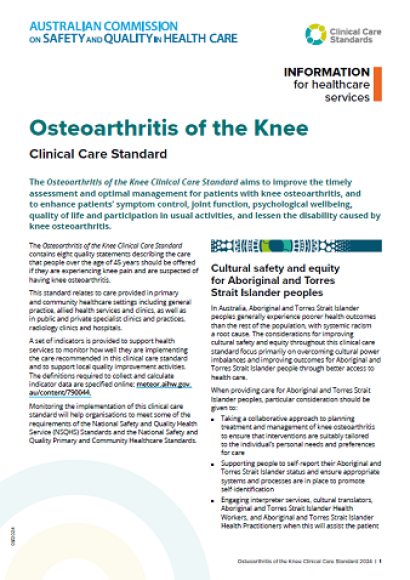Information for healthcare services - Osteoarthritis of the Knee Clinical Care Standard
Guidance for healthcare services on the eight quality statements from the Osteoarthritis of the Knee Clinical Care Standard, as well as helpful resources.
What healthcare services need to know
The Osteoarthritis of the Knee Clinical Care Standard contains eight quality statements describing the care that people over the age of 45 years should be offered if they are experiencing knee pain and are suspected of having knee osteoarthritis.
This standard relates to care provided in primary and community healthcare settings including general practice, allied health services and clinics, as well as in public and private specialist clinics and practices, radiology clinics and hospitals.
A set of indicators is provided to support health services to monitor how well they are implementing the care recommended in this clinical care standard and to support local quality improvement activities. The definitions required to collect and calculate indicator data are specified online: https://meteor.aihw.gov.au/content/790044.
Monitoring the implementation of this clinical care standard will help organisations to meet some of the requirements of the National Safety and Quality Health Service (NSQHS) Standards and the National Safety and Quality Primary and Community Healthcare Standards.
Note: Where information is provided ‘for healthcare services’ in this standard, it is intended for those responsible for leading and governing the service. Healthcare services deliver health care in a wide range of settings, and vary in size and organisational structure from single healthcare providers to complex organisations.
Cultural safety and equity for Aboriginal and Torres Strait Islander peoples
Aboriginal and Torres Strait Islander peoples generally experience poorer health outcomes than the rest of the population, with systemic racism a root cause. The considerations for improving cultural safety and equity throughout this clinical care standard focus primarily on overcoming cultural power imbalances and improving outcomes for Aboriginal and Torres Strait Islander people through better access to health care.
When providing care for Aboriginal and Torres Strait Islander peoples, particular consideration should be given to:
- Taking a collaborative approach to planning treatment and management of knee osteoarthritis to ensure that interventions are suitably tailored to the individual’s personal needs and preferences for care
- Supporting people to self‑report their Aboriginal and Torres Strait Islander status and ensure appropriate systems and processes are in place to promote self‑identification
- Engaging interpreter services, cultural translators, Aboriginal and Torres Strait Islander Health Workers, and Aboriginal and Torres Strait Islander Health Practitioners when this will assist the patient
- Engaging Aboriginal and Torres Strait Islander Health Workers and Aboriginal and Torres Strait Islander Health Practitioners as part of a patient’s multidisciplinary team
- Encouraging the inclusion of a carer, family member or friend in all aspects of care, including decision making and management planning
- Providing flexible service delivery to optimise attendance and help develop trust with individual Aboriginal and Torres Strait Islander people and communities.
See also additional resources for supporting culturally safe and equitable care, including osteoarthritis resources.
What the quality statements mean for healthcare services
Resources for healthcare services
The resource below has been developed to support healthcare services implementing the Standard.
See also our complete set of information resources including:
- resources for consumers, clinicians, and PHNs
- implementation resources
- additional related resources for healthcare services.


